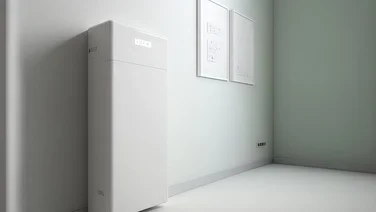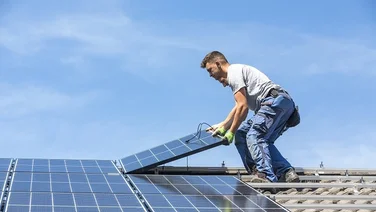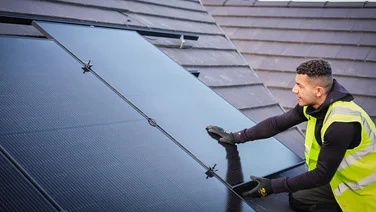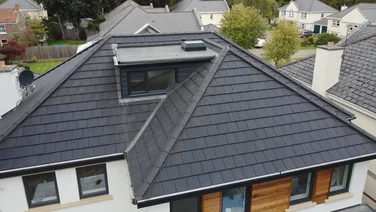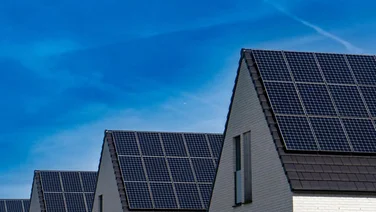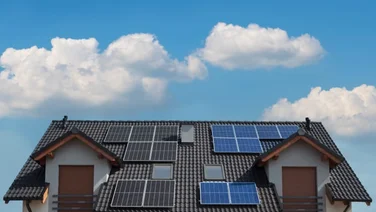We receive a small fee from trusted installers when you request a quote through our site. This helps us keep our content independent, well-researched and up to date – Learn more
- What is a solar-powered generator?
- The pros and cons of solar-powered generators
- How much do solar-powered generators cost?
- How much capacity do solar-powered generators have?
- Do solar-powered generators need much maintenance?
- Do solar-powered generators make much noise?
- Are solar-powered generators worth it?
- Summary
✔ Solar powered generators are quiet and ideal for camping or boating trips
✔ They’re usually easier to maintain than fossil fuel-powered generators
✔ They can be expensive, and don’t always have a high power output
With all the environmental issues the world continues to face, going solar is becoming a must. And solar-powered generators are are just one of many new kinds of solar technology that can help cut emissions and costs.
They are a lifesaver for portable power – whether that’s for an off-road adventure or to reduce your reliance on the grid.
From understanding their functionality to evaluating their worth, this comprehensive guide breaks down everything you need to know about these eco-friendly power boxes.
Already inspired to make the switch to solar? Fill out our quick web form to receive free solar panel quotes tailored just for you.
Where do you want to install solar panels?
Get started
What is a solar-powered generator?
A solar-powered generator is a system that converts sunlight into electricity using attached solar photovoltaic (PV) panels.
Unlike traditional generators that run on fossil fuels, solar generators produce clean, renewable energy without emitting greenhouse gases. They offer a sustainable solution for various power needs, from backup electricity for homes to power for off-grid trips in far-flung locations.
How does a solar-powered generator work?
A solar-powered generator typically has four components:
- Solar PV panels
- Charge controller
- Storage batteries
- Solar inverter
Like a household solar array, the PV panels – which are often separate add-ons connected to the generator unit – absorb sunlight and convert it into electricity to be used instantly or stored in the generator’s batteries. From there, you can connect various devices, from lights to appliances, directly to the generator.
You could, in theory, power your house with a solar generator, but its capacity must match your household’s energy needs. Larger solar generators, coupled with enough battery storage, can handle multiple appliances and systems.
However, if you want constant power for your whole house, a complete solar panel system is usually your best bet.
Thanks to the stored energy in the batteries, you’re not limited to daytime use. As long as the battery has a sufficient charge, the generator provides power even after the sun sets.
The pros and cons of solar-powered generators
- Zero greenhouse gas emissions
- Sunlight is free, so no fuel cost
- No loud engine noises
- Some models are lightweight and easy to transport
- Fewer moving parts mean less wear and tear
- The upfront investment can be significant
- Less effective on cloudy or rainy days
- Solar panels need space for optimal performance
- Can't instantly produce large amounts of power like fuel-based generators
- Storage batteries degrade over time and need replacement
Solar-powered generators are a must-have for eco-conscious adventurers: they generate clean energy without the emissions of conventional gas or diesel generators.
Once set up, their operating costs are minimal. There’s no need to buy fuel, and they generally require less maintenance because of fewer moving parts. Plus, they operate silently, providing a significantly less jarring alternative to the often loud conventional generators.
On the flip side, the initial investment for a solar-powered generator can be hefty – especially as the batteries have a finite life, meaning they’ll need replacement after several years. There may also be extra costs for additional panels to get the maximum benefit of solar energy.
The weather can also slow them down. On a cloudy day, they might not make enough energy to keep up, making them slower to generate energy than their fossil-fuelled counterparts.
Where do you want to install solar panels?
Get started
How much do solar-powered generators cost?
The cost of a solar-powered generator varies depending on its size, type, and the quality of the solar panels it uses. Here’s what you can expect to pay for a standard range of sizes:
Size | Power rating | Price range |
|---|---|---|
Small | 0.2-0.5 kWh | £200-£800 |
Medium | 1-1.8 kWh | £700-£1,500 |
Large | 2-2.5 kWh | £1,400-£2,900 |
How much capacity do solar-powered generators have?
Solar generators can generate different amounts of power based on their design and intended use. To find the perfect solar generator, think about how much energy you need and find one with the right capacity.
Their capacity is measured in watt-hours (Wh) or kilowatt-hours (kWh):
- If you just need to charge your phone or run small appliances, there are solar generators with capacities as small as 200 Wh.
- Mid-range models range from 500 Wh to 2 kWh, so you can use them for longer periods or with bigger appliances.
- Larger, high-end models can go beyond 2.5-3 kWh and power heavy-duty devices or multiple things at the same time.
How long do they take to charge?
The time to charge solar-powered generators depends on the size of the solar battery, solar panel wattage, and how much sun they get.
Smaller portable units with moderate sun exposure can take anywhere from 2 to 12 hours. Larger systems with more extensive solar arrays might need a few days to fully charge, especially in areas with limited sunlight.
To speed up the process, some users supplement with wall- or car-charging on the go, or by connecting additional solar panels to get them to maximum capacity.
Do solar-powered generators need much maintenance?
Solar-powered generators are easier to maintain than fossil fuel-powered ones. Since solar panels don’t move, they don’t wear out easily.
With that being said, here are some maintenance tips for getting the best out of your solar generator:
- Panel cleaning: Keep your panels clean to keep them working well – dust, dirt, and bird poop can mess up their efficiency.
- Battery care: Depending on the battery type, you may need to give them some TLC or replace them after a few years.
- Component inspection: Don’t forget to give the wires and connections a once-over every so often for any wear and tear.
- Inverter inspection: Even though inverters have a long lifespan, they might need to be replaced before the panels.
A bit of upkeep and regular checks can go a long way in keeping your solar generator in tip-top shape.
Do solar-powered generators make much noise?
Solar-powered generators are a great option if noise is a problem for you. They are notably quieter than traditional fuel-powered generators since they don’t have a combustion engine.
The only potential sources of noise in a solar-powered generator are the solar inverter and, occasionally, cooling fans. The noise from these components is minimal, just a soft hum that’s easy to ignore.
Are solar-powered generators worth it?
Whether solar generators are “worth it” mostly depends on what you need and what your situation is. As an environmentally friendly option that makes clean energy with no harmful emissions, they’re particularly useful in remote areas without access to the power grid or during power outages.
With time, you’ll save cash by cutting fuel and electricity costs. However, the initial investment can be high and they only work well when the weather is on their side.
For those prioritising sustainability, quiet operation, and long-term savings, they’re an excellent choice. But for those needing immediate high-power output with a tight budget, traditional generators might be more suitable.
Summary
By blending environmental responsibility with technological advancement, solar-powered generators stand out as a clean, quiet, and efficient alternative to traditional power sources.
If you’re contemplating a shift towards renewable energy and being less reliant on the grid, there’s no better time than the present. We can help you find the best solar solutions – just share a few quick details with us and get your free personalised quotes for solar panels.


